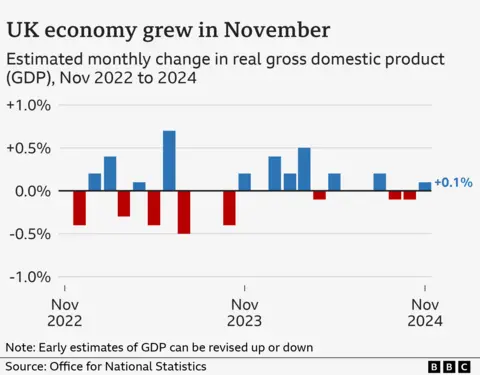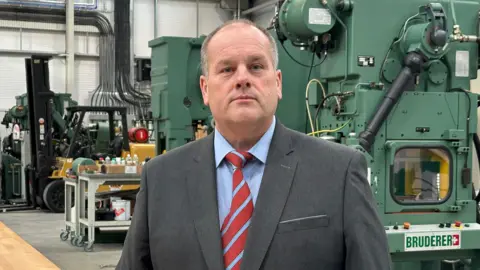 Getty Images
Getty ImagesThe UK economy grew for the first time in three months, driven in part by a boost in trade for pubs, restaurants and the construction industry.
Official figures showed an expansion of 0.1% after the economy shrank in each of the two previous months.
The return to growth will be a welcome sign for the government after recent turbulence in financial markets sent its borrowing costs to the highest level for several years and the value of the pound fell.
But the figure was lower than economists had expected, with declines in manufacturing and business rentals and leasing.
Chancellor Rachel Reeves reiterated her pledge to go “further and faster” to improve economic growth in order to boost living standards, declaring it was the “number one priority” for the government.
“That means generating investment, driving reform and a relentless commitment to root out waste in public spending,” she said.
However, with tax rises set to come into effect in April, businesses have repeatedly warned the extra costs faced through hikes in National Insurance, as well as the minimum wage, could impact the economy’s ability to grow, with employers expecting to have less cash to give pay rises and create new jobs.
In the three months to November, the economy is estimated to have shown no growth, the Office for National Statistics (ONS) said.
Liz Martins, senior economist at HSBC, said the economy had flatlined and sentiment among businesses had “really deteriorated in recent months”.
“We’ve had a pretty gloomy start to this year,” she said. “We’re not in recession, but we’re not doing much growing either.”
In a bid to turn the tide, Reeves will meet representatives from some of the country’s biggest regulators later, including energy watchdog Ofgem and the Competitions and Markets Authority, to get ideas for growing the economy.
Reeves is understood to have decided to meet them in-person rather than wait to read submissions, with a Treasury source describing the meeting as “a kick up the backside”.

The ONS said the construction and services sectors drove the marginal growth in November.
Construction was led by new commercial developments, but Liz McKeown, director of economic statistics at ONS, said production continued to decline in November with “further falls across several manufacturing industries and oil and gas extraction companies”.
“Services grew a little, with wholesaling, pubs and restaurants and IT companies all doing well, partially offset by falls in accountancy and business rental & leasing,” she added.
‘Put the handbrake on’

Adrian Haller, who runs the UK arm of Bruderer, a Swiss manufacturer that makes high speed presses, is preparing to open a new factory in Telford, Shropshire.
But Mr Haller is in no doubt that the Budget “put a dampener” on the business, with some of his biggest customers more cautious after the rise in employer National Insurance contributions was announced.
“Consequently, they’ve reduced their interest in placing orders with companies like ours.”
Mr Haller said that at the beginning of last year “manufacturing was going great guns” but after an expected pause around the general election, activity has failed to pick up.
“Everybody seems to have put the handbrake on,” he said. “All that I ask, is that the government listen to what we are trying to say, and the fact they’ve done too many changes too quickly – and it’s making it difficult for us to survive.”
A growing economy usually means people are spending more, extra jobs are created, more tax is paid and workers get better pay rises.
When the economy is shrinking, it can lead to businesses cutting back on investment and jobs.
Rob Wood, chief UK economist at Pantheon Macroeconomics, said tax hikes announced in the chancellor’s October Budget and “global uncertainty” around Donald Trump’s potential tariffs on trade with the US had “dragged the economy into stagnation”.
The weaker-than-expected growth figures fuelled further expectations that the Bank of England will cut interest rates at its next meeting in February from 4.75% to 4.5%.
But Mr Wood said the outlook for 2025 was brighter than the figures were showing for 2024, with consumer demand appearing to be “solid”.
He said despite the tax rises on businesses coming in April, the economy should get a boost from Reeves “recycling increased taxes into even more spending” in 2025.



